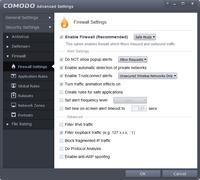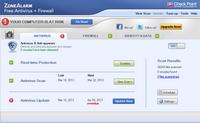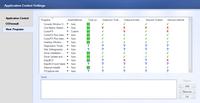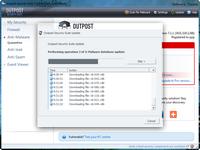|
In a Hurry?
|
|
|
|
Introduction
|
|
This website, and others, have long advocated the use of layered protection to secure a Windows PC in the knowledge that a standard antivirus is often not enough. Vendors are also pushing this approach and most now offer an internet security suite as their leading product. In addition to the normal antivirus, internet security suites include a firewall and other security components. The exact make-up varies between products so be sure to check the information pages before deciding which best suits your own needs. As ever, there are freeware products that are just as good as the commercial programs.
Please note that security product reviews range from being a useful resource to complete nonsense so do not use these solely to choose a security suite, or worse still, change the one you have already*. Beware too of media reviews that are biased towards the commercial products advertised on the same site. You need to consider for instance why the discrepancy between these independent results and these from a media publication for the same product? :)
*The incorrect removal of an existing security program can adversely affect later installations of new products and/or possibly the operation of your Windows system. Always use the dedicated tool for this purpose provided by the vendor and never a third party program wound up to its most aggressive setting. Doing so invites a recipe for disaster as does the use of so called registry cleaners or other types of clean/tweak tool which almost always contain a registry component.
|
|
Discussion
|
|
Be sure to check out the options in the first install window. Some, like Comodo's DNS service and behavior analysis, you might want, but the search engine change to Yahoo!, you might not. :)
Be aware also that unless you check the “customize installer” option and de-select what you don't need, you'll end up with their GeekBuddy service and Comodo Dragon browser. You can also at this point choose the level of alerts presented by the program via the “Configurations Options” tab.
Once you have installed and updated the signature definitions, you can begin to configure the settings. The window above is just one of many and illustrates why I don't believe this program to be suitable for the inexperienced.
Comodo help guide page. Chiron's highly comprehensive setup guide.
Application control is clear and precise and there is just enough HIPS protection to be useful without being too obtrusive.
A few notes to help maximize the protection potential for ZoneAlarm, depending of course on what your personal requirements might be.
The install is via a web installer (a small executable that connects to the internet when launched to download and install the main program components).
Settings:
After the initial update, the normal automatic sequence thereafter is every twenty four hours, but you can choose to update manually at any time for optimum protection if you wish.
Once you restart your computer, or maybe before depending on the circumstances, you will begin receiving alerts for system processes. The firewall alerts will begin straight away.
As with all security software, you cannot expect optimum protection unless you are prepared to familiarize yourself with the program components, how they work, and how to respond to alerts. The ZoneAlarm PDF userguide link is here on their support page.
After installation, Outpost starts in Auto-Learn mode so you will need to disable this via the program settings if this is not how you wish it to behave. You will also need to register the program but this is free and the key will be sent to your email.
Be aware that the Outpost download redirects to cnet which uses a wrapped installer. You can avoid this by using the Softpedia download link instead.
|
|
Related Products and Links
|
|
You might want to check out these articles too: Best Free Antivirus |
Comodo Internet Security
ZoneAlarm Free Antivirus + Firewall
Outpost Security Suite Free
|
Editor
|
|
This category is maintained by volunteer editor MidnightCowboy. Registered members can contact the editor with any comments or suggestions they might have by clicking here. |
|
Tags
|
|
free, antivirus, internet, security, suite, firewall |
Back to the top of the article.




 We are looking for people with skills or interest in the following areas:
We are looking for people with skills or interest in the following areas:

Comments
It's sad there aren't many security products that offers an integrated firewall. That being said, I've used "ZoneAlarm Free Antivirus + Firewall" before and my experience with it has been positive.
I've been very pleased with Comodo Internet Security Premium since I've been using it for the last 2 months or so, having previously just used Comodo firewall along with the increasingly problematic Avast free anti virus. I don't find it too complex and I'm by no means a techie, just an average Joe who's picked up a few things along the way.
The biggest problem I've found is the difficulty in uninstalling (in my experience a clean install really is necessary for new versions of Comodo security products to avoid problems) and, despite Chiron's excellent guide, this long and laborious process is, quite understandably, enough to put many people off bothering with Comodo.
In my experience Comodo has been significantly more problematic to uninstall/install than other security software, even when using Chiron's guide. True, this isn't something that will be encountered every day, but it may well come as a nasty shock when the time comes to update to a new version. In order for people to be able to decide for themselves whether this laborious, complex and frequently unreliable procedure is a price worth paying for an excellent free security suite, this is Chiron's CIS update guide:
http://forums.comodo.com/install-setup-configuration-help-cis/most-effec...
ZoneAlarm is well-known spyware. It installed several potentially unwanted programs (PUPs) on my PC, such as PUP.Optional.Softonic, PUP.Optional.OpenCandy and PUP.Optional.Tarma.A in addition to hijacking my browsers' home pages and search engines. I had to use Malwarebytes' Anti-Malware to remove the malware. Stay away from ZoneAlarm.
Following your recommendation, I'll give Zone Alarm a try. Just from the installation process, I'm a bit irritated, however, as it does not look very professional. The program installed in German, which is my native and system language, and a considerable part of the installer looks like someone used Google translate to come up with a raw approximation of German, or if they had let someone who once took a few months of German have a go with a dictionary. There were parts that I had to mentally re-translate badly into English in order to figure out what the text was supposed to tell me. Even better, lines of texts were just breaking off in the middle; probably, two lines of text sufficed for English, but as German usually takes more space, the installer design just cut them off in the middle. Somewhat annoying if you're trying to avoid installing additional bloatware.
I can't seem to locate language-specific installers, otherwise I might just switch to English. I'd be a lot more comfortable with that than with a garbled version of German.
I wish people would realise that if they do provide a translation to other languages than that of their company, they should have it done by people who are actually competent. And if they don't have the infrastructure to maintain professional translation, just *don't translate* to the language in question. Google Translate does *not* work as an adequate professional-level tool if you translate into a language you don't know.
im surprised online armor is not mentioned but its ok. what i wanted to say here is that comodo simply ruined everything when they changed there interface to be more windows 8 fancy feeling. all the hidden settings, the buried components, and the flashy appeal. i was so disgusted and angry when i first seen it i even wrote them a letter about it. it was never answered!! IF ITS NOT BROKE, THEN DONT FIX IT..!!! the old style interface was incredible. no flash, and drama. just simple effective security that said beat this!!! now look at them. ive heard so many others complain also...some mr cool sitting in there research department thought up this failure of a design. where do they get these people? how much do they get paid? sorry but im angry at comodo, and i guess it shows.
I got an initial bad impression as well. The interface is very different from what it used to be. I also complained about it, and believe me, we're not the only ones. But another thing to say is: I also believe Comodo is listening to users. There have been suggestion of a choice between simple and advanced interfaces and many other suggestions to enhance the UI experience. Let's hope they can improve upon what they've done so far.
However, having said that, after the initial bad impression of the interface, and after having used the program for some time, I really have come to like it. It is definitely not as bad as the first impression would have it seem. Aside from some extra tray controls and extended summary that v5 had, the new interface is quite good. You can use the Widget to get immediate access to many functions, and if you don't like the Widget, you can do that with the main screen, and even configure those buttons to take you quickly to the most important tasks for you, which is quite interesting.
'Virtual Kiosk' feature comes with "Comodo Internet Security" free version?
Like I say in my first comment, CIS is a 'freemium' product, that is, it is not a crippled or watered-down version of the paid product. It is exactly the same as the paid version. The perks of the paid version are not in the program itself. The free version does come with the Virtual Kiosk (there's more detail in another post by me below).
I don't want to sound like a parrot either, but I think some points are still worth making or reiterating:
In the article, you recommend some tweaks that are easy to do for ZoneAlarm. There are equally easy tweaks for Comodo (the user can choose between three preset configuration settings http://help.comodo.com/topic-72-1-451-4871-comodo-preset-configurations....), but you haven't mentioned them. And Comodo comes preconfigured in a way that is sufficient for most users -- they simply won't have to configure it.
Both applications come with components that may or may not be wanted and are optional.
Comodo Dragon and Microsoft Silverlight are not required to use the Virtual Kiosk. You can use it with any browser, and Silverlight mostly adds eye candy.
I'd choose Comodo Internet Security as my top pick. Even though ZoneAlarm is a good product as well, I bring up the following points:
1) CIS is safer than ZA.
CIS has a very strong HIPS component. Maybe ZA has a better AV component, but then it doesn't update many times a day, and this can be a problem when you have a dangerous virus in the wild that requires quick updates. Of course you can do it manually, but for the average user, they won't even hear about it until it's too late.
Comodo has a default deny policy that partially sandboxes any unknown program thus allowing most programs to function in this way and at the same time blocking virtually any potential threat. This more than compensates for the (slightly) weaker AV (Comodo AV is on par with Avast or AVG in my opinion). Many viruses go undetected for days even when we talk about Kaspersky or ESET or Avira, or any other AV company. The safest way to deal with unknown threats is to consider them 'guilty until proven innocent', and Comodo does that automatically.
CIS is a 'freemium' product, that is, it is not a watered-down or crippled version of their full product.
2) CIS is much lighter than ZA.
CIS can run even on a very low-end system. I know this from firsthand experience. It uses very little RAM and very little resources in general. ZA on the other hand uses RAM like it's a first-person shooter.
3) CIS is not hard to use.
Maybe this is just my opinion, but with Chiron's guide for example, anyone can configure CIS to their liking with a lot of useful guidance (the Comodo community is very active and generally helpful in their Forum). There's also a very helpful help here: http://help.comodo.com/topic-72-1-451-4685-introduction-to-comodo-intern... And if the user doesn't want to read through all of those guides unless necessary, there are preset configurations http://help.comodo.com/topic-72-1-451-4871-comodo-preset-configurations.... that can be activated to easily turn up all the protection systems.
[Edit] Details about commercial version removed
Just to sum up the message, really =) Here it is:
I am Brazilian and I have become the Brazilian Portuguese translator for CIS exactly because I think CIS is such an incredible product, and I wanted my whole family and friends to be able to use it (and in effect my whole country now will be able to use it, and maybe even other Portuguese-speaking countries since I'm the only one translating to Portuguese). I have no business ties with Comodo in any way, all my work is entirely voluntary. And so is the time I'm spending to write this message. I know you do this as a volunteer as well, and out of a wish to share knowledge and help others. I can relate to that and admire your effort. So here's my contribution for your consideration, hopefully we'll be able to help others with a solid safety recommendation.
All the best,
Jaspion
I simply don't find Comodo hard to use at all. I used ZoneAlarm briefly, and I might even consider testing it again just to be more precise and reiterate or even correct if necessary what I'm going to say: Comodo generates less popups than ZoneAlarm. I find Comodo easier to use than ZoneAlarm (or at least as easy to use), I think Comodo can easily be an install-and-forget program for those that do not want to tweak it.
The usability test you linked is not about user interface or ease of use, but about false alarms. I don't get too many of those to be honest, as Comodo's whitelist is very large. Those false alarms are because of Comodo's default deny policy of blocking anything unknown. This is much safer than simply blacklisting with the AV engine. When people use their computer for online shopping, online banking, important work, etc etc, I think the main aspect to be regarded when choosing a security package is the security itself! Usability comes second, which doesn't mean it's not important, but again Comodo Internet Security is not hard to use at all in my honest opinion.
That's what I think too. I don't think most users find CIS hard to use. The article states that there are too many configurations hence it's difficult to use. To me that's not true since it comes preconfigured in a way that is safe and requires no further tweaking by the user -- unless the user wishes to do that, in which case it offers great flexibility.
I agree, false alarms do diminish usability. But security is about compromise. And at the end of the day, what do you want to compromise? Safety or usability?
And there's another thing to be considered: Comodo's default deny that blocks anything absent from the whitelist will generate false alerts in some cases, yes, but it will also greatly reduce the number of false alerts in many other cases. Because if an application is whitelisted, it won't generate any popups or alerts (unless the user specifically configures CIS to do that), whereas ZA may generate alerts for safe applications (I remember this from the last time I used ZA, so I'm not 100% sure of how this applies to the current version).
Comodo Internet Security also features the Virtual Kiosk, which is a completely sandboxed desktop environment where you can do online banking, shopping, even install and test programs, and all modifications will be made inside the Kiosk only, leaving the system intact.